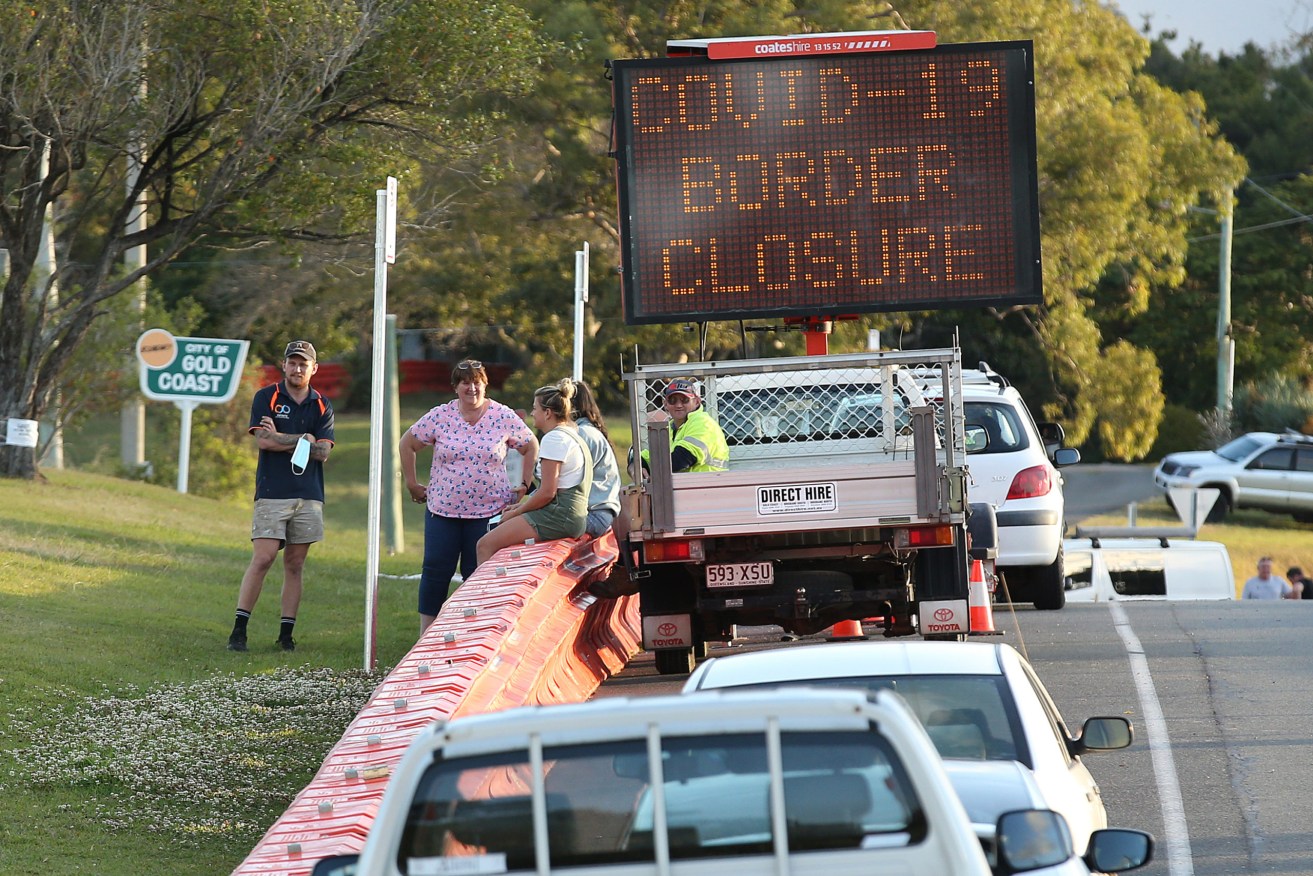Queenslanders forced to wait as interstate arrivals get jump in quarantine race
Since the Palaszczuk government eased the ‘pause’ on hotel quarantine, people relocating to Queensland from COVID-19 hotspots have been quickest through the gates.

Barriers on roads entering Queensland mean that most people wanting to travel to the state have to catch a flight. (AAP Image/Jono Searle)
Health and police officers advised the government a two-week ‘pause’ was necessary due to the unexpectedly high number of travellers requiring hotel quarantine rooms.
Such high demand was forcing authorities to find additional hotels – and ensure staff were trained in infection control – at a time when an expert national committee was reiterating the need to do everything possible in those facilities to prevent COVID-19 outbreaks.
“We are scrambling for hotels and this has got to stop,” Premier Annastacia Palaszczuk said on August 25.
“Queensland is being loved to death.”
But with the exemptions process already proving controversial, and the government facing claims of double standards in relation to footballers’ entourage allowed into Queensland, the ‘pause’ was soon eased.
Palaszczuk initially announced rooms would be available for 50 families from Saturday, and then another 680 rooms from Monday.
Deputy Police Commissioner Steve Gollschewski said he anticipated to see “about a 50-50 split” of approvals, between returning Queenslanders and people relocating to Queensland.
“We’re trying to balance that out with people coming into our state,” Gollschewski said on Monday, adding that 800 rooms were being vacated.
But by 5.30am yesterday, people relocating to Queensland outnumbered returning Queenslanders two-to-one, even with a requirement to provide additional evidence to support their applications, such as proof of a Queensland job.
A Queensland Police Service spokeswoman said there had been 103 applications from returning residents and 208 relocation applications approved since the ‘pause’ was eased.
“All applications are assessed chronologically from the time of submission,” the spokeswoman said.
“Whilst a general statistic of 50-50 had been planned for, the numbers will depend on actual applications received. Approvals will be based on the number of available quarantine rooms at that time.”
Some 3,000 Queenslanders were reportedly interstate when the ‘pause’ was announced, however their circumstances would differ, and the prospect of having to pay for 14 days in hotel quarantine may influence whether or not they apply. Thousands of Australians remain stranded overseas.
The NSW Government is today expected to announce when the lockdown will be lifted in some parts of the state, which may lead the Queensland government to allow more travel to and from those areas. Most travellers from COVID-19 hotspots to Queensland currently have to pay for flights, not drive, and hotel quarantine is mandatory on arrival.
Some groups, such as the National Rugby League and Australian Defence Force, have been allowed their own quarantine bubbles, while boarding school students returning for the holidays will be allowed to quarantine at home under a trial.
Meanwhile, Scott Morrison has indicated Australians stuck overseas will be able to return and quarantine at home later this year, as he acknowledges their frustration and heartbreak.
In a pre-recorded video message, the prime minister thanked expats for carrying a “very heavy burden” for the past year-and-a-half.
Morrison flagged vaccinated Australians would be able to come home later this year and quarantine at home.
Home quarantine is currently being trialled in South Australia, but the government wants it to become the norm for returned travellers.
“We are looking forward to welcoming many people back home soon. We can get there this year,” Morrison told an awards ceremony for high-achieving Australians working overseas.
“I thank you once again for your patience and enduring what has been a very frustrating and very difficult time for you.”
Australia is preparing to roll out vaccine passports from October to pave the wave for the resumption of international travel.
But this isn’t expected until vaccination coverage for people aged 16 and older reaches 80 per cent.
The national vaccination rate is currently half that.
“I know for Australians overseas it has been a very difficult and frustrating time,” Mr Morrison said.
“It’s tough living through a pandemic and being separated from your family and that’s brought its own heartbreak, life’s moments missed that you will never get back.”










